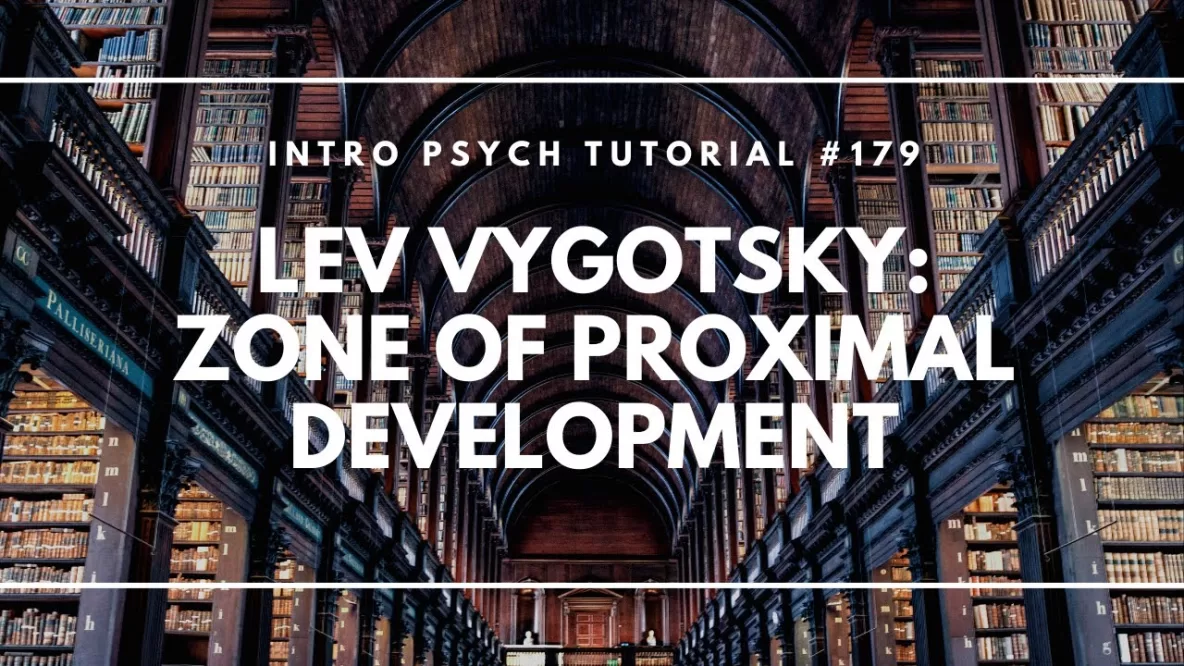In this video I consider how it is that we improve our skills and abilities and how children make progress through different stages of development. This brings us to the work of Soviet psychologist Lev Vygotsky and his notion of the zone of proximal development. This refers to tasks outside of a child’s current level of ability that can be accomplished with assistance (or scaffolding) from a parent, teacher, or peer.
Don’t forget to subscribe to the channel to see future videos! Have questions or topics you’d like to see covered in a future video? Let me know by commenting or sending me an email!
Check out my full psychology guide: Master Introductory Psychology: http://amzn.to/2eTqm5s
Video Transcript
Hi, I’m Michael Corayer and this is Psych Exam Review. In the past few videos we’ve been looking at Piaget’s theory of cognitive development along with some related topics and we’ve been thinking about the skills and abilities that children develop over time as they progress through these stages. But what we haven’t really addressed is how it is that children make this improvement? How is it that they acquire particular skills? Or how is it that they stopped making particular types of errors?
And this brings us to consider the role of the social environment in shaping development. So when I talked about assimilation and accommodation, I gave an example of a child accommodating, updating their knowledge structure or schema, based on some experience like seeing a bunch of things that are called birds and then making the error of calling a bat a bird. And in this case, it was necessary that somebody provides feedback to the child; that an adult says “actually a bat is not a bird”. This gives the child the information to update their schema, right? To recognize that not all small flying things are birds. So here we see the importance of this feedback from another person in order for the child to update the schema, right? The child wouldn’t know that a bat is not a bird without someone stepping in and providing that guidance and saying “actually this word is not used that way, you can’t call a bat a bird”. So this brings us to consider the role that adults or even other children can play in shaping development.
And this brings us to the ideas of Lev Vygotsky, who was a Soviet psychologist born in 1896 in what’s now Belarus, and who lived until 1934, where unfortunately he died rather young of tuberculosis. And here’s a picture of Vygotsky here. One of Vygotsky’s ideas is that children are able to progress just at the edge of their ability and he called this the Zone of Proximal Development. This refers to any of the skills that are just outside of a child’s current level of competence. And so they’re not able to complete these tasks independently, but if they get a little bit of help from somebody, whether it’s a peer or parent, or a teacher, then they’re able to complete this task. And so this additional help is referred to as “scaffolding” and it helps to support the direction of growth.
So we have a child who is just almost able to do something and somebody else steps in and gives them just enough assistance to accomplish it, and then by doing this the child, in the future, will be able to accomplish it on their own. So that’s how they learn to improve their skills. If we were to express this graphically, we might just think of, you know, if this blue circle here represents a child’s current abilities, then the zone of proximal development would be this area just outside of that, right? So these are just beyond the child’s reach. But we could also think about somebody providing just a little bit of assistance, just that extra push that allows the child now to accomplish this task here. And then over time, if we’re doing that in, you know, all these different areas of development, then we’re sort of expanding the child’s competence.
And of course this doesn’t just apply to children. We could think about this Zone of Proximal Development for any skill where somebody might be able to accomplish something with just a little bit more help. So whether it’s, you know, high school students or college students who are in an undergraduate program and then they’re getting a little bit of help from advisors in order to you know tighten up their writing, and now they’re able to write things that they couldn’t write before. And then they’re in graduate school and they’re getting additional support, right, for even more challenging tasks. And so this is something that we can apply to any type of learning throughout our entire lifespan, not just for something like moving through Piaget’s stages of development.
And this idea that we depend on others to help shape our development and they help to push us to do things that we can’t do independently brings us to the consideration of how it is we learn how to make connections with other people. How do we get these people who are helping us in our development? How do we connect with them? How do we form social relationships? That’s what we’re going to look at in the next video, starting with the most important relationship, the first relationship that we might form, with our mother; which is referred to as attachment. So I hope you found this helpful, if so, please like the video and subscribe to the channel for more. Thanks for watching!

